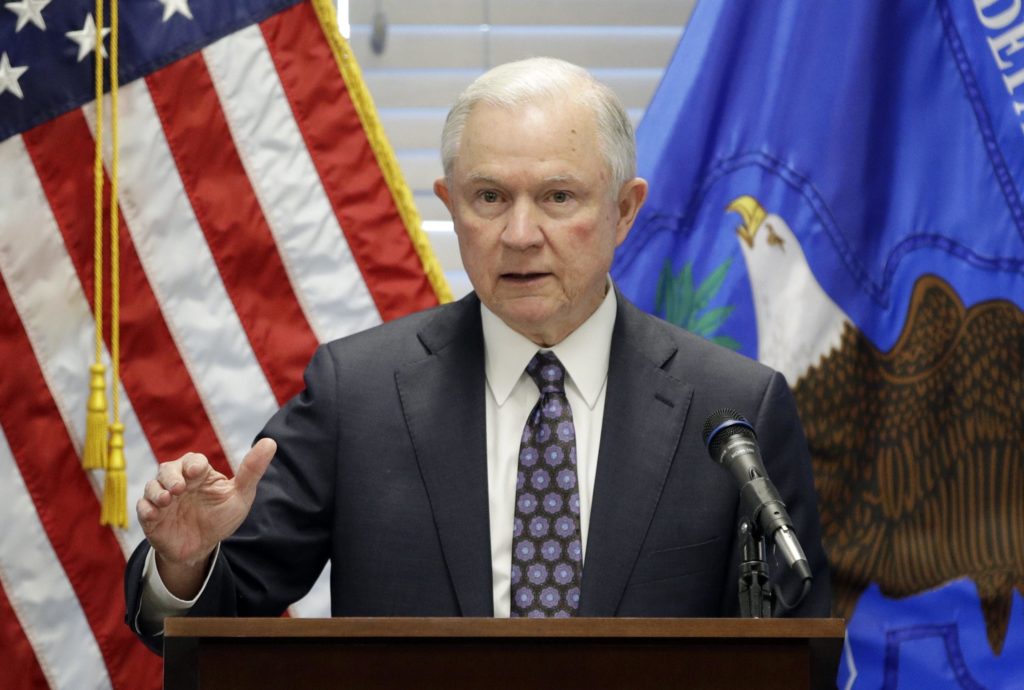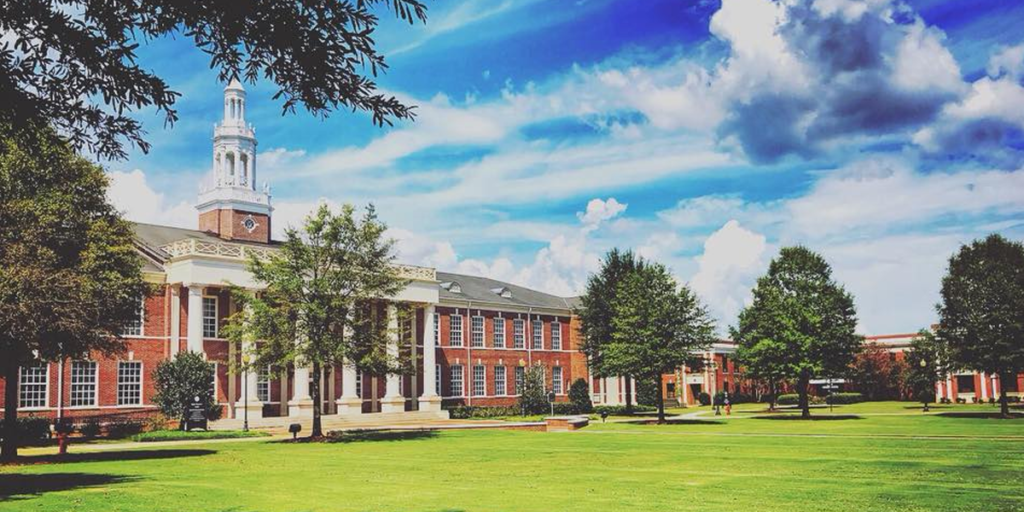Jeff Session tells law enforcement: ‘We have your back’

U.S. Attorney General Jeff Sessions on Monday praised President Donald Trump as a “law and order” president and told a gathering of law enforcement officials that they have support from the White House and the Justice Department. In a visit to his home state of Alabama to speak at the department’s National Public Safety Partnership Symposium, Sessions praised the program’s partnership between the federal government and communities to help fight violent crime. “Each one of you can be certain about this: we have your back and you have our thanks,” Sessions said. Sessions touted the efforts of the Justice Department to fight violent crime and “back the blue.” He said Trump took office with a mission to restore public safety, and said it is a switch from those that “saw police as the problem in America.” “Make no mistake about it President Trump is a law and order president,” Sessions said. Sessions said new FBI crime statistics being released Monday will show that violent crime and murder declined in 2017. The former Alabama senator spent the weekend in his home state. He did not mention Trump’s recent criticism of him for recusing himself from the Russia investigation or the controversy surrounding Deputy Attorney General Rod Rosenstein and reports that Rosenstein might have suggested secretly recording Trump. Sessions joked that he appreciated the warm welcome after receiving loud applause as he walked on stage at the law enforcement gathering. “It’ll make my day. … Who knows? I may need this today. Going back to Washington you never know what is going to happen next in the capital city that’s for sure.” Sessions announced new grants for ballistic technology and improved investigative practices through Crime Gun Intelligence Centers for Indianapolis, Memphis, Baton Rouge and Tulsa. He also announced grants for technology improvements for Houston, Memphis and Toledo. Republished with permission from the Associated Press.
Yes, I can support sexual assault victims and believe Brett Kavanaugh should be confirmed

A week ago today, I wrote about the trap that liberals are trying catch conservatives in: Either you believe the unsubstantiated sexual assault allegations against Supreme Court nominee Brett Kavanaugh lock, stock and barrel without questions, or you are anti-feminist. You are pro-sexual assault. You are heartless, unkind, unsympathetic, the character assaults against you are relentless. In recent days, those cries have gotten stronger and louder. Which is why I want to go on record saying those who want to stand up for truth, justice and fairness need to stand by Brett Kavanaugh and not be bullied or shamed themselves. There has been zero, let me repeat that: ZERO, substantiating evidence to back-up any claim of misconduct, whereas there are mountains of reasons to have questions and doubts. Including, but not limited to, statements from everybody involved in Kavanaugh’s life during that period of time and since. There are questions in the consistency, or more importantly the inconsistency, of the statements that the accuser has made both then and now. One must also question the way that this has all played out as political theatre orchestrated by the Democrats in the Senate. These are the same people who have spent millions of dollars and weeks trying to keep the Kavanaugh nomination off the floor for a vote because of their opposition to his experience and policy positions as a Constitutionalist. When they couldn’t de-rail his nomination based on the merits of his record, they are now counting on these allegations to be his ultimate undoing. I stand with Kavanaugh. That doesn’t mean I don’t support victims of sexual assault because I have and I always will. I stand for a country in which people are not bullied and intimidated for their political beliefs. I stand and ask for fairness and justice when discussing important life changing issues such as accusations such as these. I stand for a world in which honorable men and women don’t need to worry about having their life’s work tarnished by those who disagree with them. It is an important time in our country with a lot of critical decisions facing the court. The senate needs to confirm Brett Kavanaugh to the Supreme Court, and to do it in a timely manner. I hope people get wise to weaponization of sexual assault, which has been normalized as of late, and recognize that there are some who would use a false accusation as a tool in their arsenal meant to destroy the reputation and opportunities of good people they simply disagree with. I hope as a Alabama resident our U.S. Senator Doug Jones confirms Kavanaugh and doesn’t allow himself to be bullied into opposition.
Randall Woodfin wants to buy band uniforms for all 7 Birmingham city high schools

Nearly two weeks after news broke that Mountain Brook High School band donated their old uniforms to Birmingham’s Woodlawn High School, Birmingham Mayor Randall Woodfin took to social media to announce that now he wants to buy band uniforms for all seven Birmingham city high schools. “I 100 percent support Birmingham City Schools, particularly our bands. I was a drummer from fourth grade until eighth grade – I walked in their shoes and I understand their commitment to excellence,” Woodfin said in a post accompanying the Monday afternoon video. “Let’s continue to invest in our students.“ According to the video, Woodfin is making a recommendation to the Birmingham City Council that the city purchase “band uniforms on behalf of all seven high schools.” The schools include: Carver High School Huffman High School Jackson-Olin High School Parker High School Ramsay High School Wenonah High School Woodlawn High School Watch the video below:
2019 could be the year Alabama lawmakers approve a state lottery

Despite being surrounded by lottery-playing states, Alabama continues to be one of only five states holding out on implementing a state lottery. But all of that could change in the 2019 legislative session. News broke this weekend that Alabama House Speaker Mac McCutcheon said a lottery will be on the 2019 legislative agenda. “I can say for sure that you’ll see a lottery bill in the first session coming up,” McCutcheon told WHNT News 19. “Now, I can’t determine what the vote’s going to be because I’ve got to see the bill.” But Monday, McCutcheon clarified those comments, saying they were out of context. “A reporter from station WHNT in Huntsville asked me last week to comment about the efforts that surrounding states are undertaking to implement lotteries, sports betting, and other forms of gambling,” explained McCutcheon. “I said the Legislature will likely see a lottery bill introduced in the first session of the quadrennium, but that response was based on a general feeling and no concrete knowledge on my part.” He continued, “As far as I am aware, no lottery bills have been drafted, pre-filed, or even discussed in any detail among members. And any effort to come forward with a lottery bill in the House would not be led by the leadership, which obviously includes me.” “I do feel that if any lottery bill were to have a chance of success, it should be defined as a traditional paper ticket lottery rather than an electronic lottery that could open the door to slot machines and other gambling devices,” he added. Gubernatorial support for a lottery If lawmakers were to pursue a lottery, neither gubernatorial candidate would likely stand in the way. Both Republican Kay Ivey and Democrat Walt Maddox seem to agree on a lottery for the state. “If the people want to vote that’s fine,” Ivey told WKRG back in August. “We have a robust economy, our budgets are strong we are able to do what we need to do so Alabama is at work and we’re working hard and is working.” Maddox, who unveiled his education lottery plan in February, continues to advocate for a lottery as a solution to the state’s ongoing budgetary woes. “The lottery has been a part of our platform since the very beginning and we certainly believe that 300 million dollars a year should be invested in college scholarships, Pre-K programs and to our schools so we can lift everyone up in the state of Alabama,” Maddox also told WKRG.
Alabama ranks 6th highest for LGBTQ discrimination complaints in workplace

According to a summertime report, Alabama employers saw the sixth-highest rate of complaints for workplace discrimination from LGBTQ employees in the nation. The report by InsuranceQuotes.com found between 2014 and 2017 there were 3.2 discrimination charges made per 100,000 Alabama residents, for a total of 167 charges. To find these numbers, analysts studied statistics from the U.S. Equal Employment Opportunity Commission, analyzing complaints related to gender identity and sexual orientation in recent years. Their findings reveal patterns in employee activism and how often they actually succeed in obtaining compensation. “Cumulatively, LGBTQ-related complaints increased substantially between 2014 and 2015 and again between 2015 and 2016. In 2017, however, complaints declined slightly from the year before,” the report reads. How Alabama compares
Doug Jones’ bill penalizes fentanyl exporters, calls out China

A bipartisan bill aimed at combatting the nation’s ongoing opioid epidemic proposes new penalties on foreign countries that turn a blind eye to drug kingpins who export deadly fentanyl to the United States. Sponsored by Alabama U.S. Sen. Doug Jones and Pennsylvania U.S. Sen. Pat Toomey, the Blocking Deadly Fentanyl Imports Act would make American foreign aid contingent upon a recipient country cooperating with U.S. drug enforcement efforts relating to fentanyl. Under this measure, a fentanyl-producing nation, such as China, would lose access to the Export-Import Bank and be ineligible for other U.S. taxpayer-subsidized aid if it fails to cooperate with the U.S. on narcotics control. “Like many places across the country, Alabama is in the midst of a substance abuse and overdose crisis, in part because of dangerous synthetic drugs like fentanyl,” said Jones. “Fentanyl not only harms those who use it, but it also poses a serious threat to our first responders should they be exposed. This legislation is another smart step to stop illicit fentanyl from being transported across our borders and into our communities.” Fentanyl has caused fatal overdoses across the United States. Sometimes added to heroin or cocaine without the user knowing, fentanyl is 50 to 100 times more potent than heroin and morphine, and can kill those who come in contact with even minuscule amounts of it. Many in law enforcement and the health care industry believe it is drug catalyst of the national opioid epidemic. This measure would also require the State Department to identify in its annual report on narcotics trafficking those countries that are major producers of fentanyl. This requirement is already in place for countries that are major sources of heroin, cocaine, and methamphetamine. “The opioid and heroin epidemic has become increasingly lethal in part due to the widespread presence of illicit fentanyl,” said the bill’s co-sponsor Toomey. “Since fentanyl can be fifty times as potent as heroin, just a tiny amount of this dangerous substance can kill a person, including first responders who may be inadvertently exposed to the drug when responding to an overdose victim or a crime scene. For the sake of our communities and the safety of law enforcement, countries like China must stop illicitly exporting fentanyl and improve their drug enforcement efforts now.” Calling out China’s role in illicit fentanyl exports With deaths from illicit fentanyl sourced from China continuing to climb at dramatic rates, it is clear more needs to be done to stem the flow of this deadly substance into our country. In September 2017 and April 2018, the United States indicted six Chinese nationals in connection with fentanyl manufacturing and distribution. All six charged Chinese nationals remain at large. In November 2017, President Donald Trump requested that China schedule fentanyl as a class, which would effectively place all fentanyl analogues under control.[10] In April 2018, Attorney General Jeff Sessions indicated he was seeking “greater cooperation” from China in sharing bank records in order to reduce illicit fentanyl imports. The Blocking Deadly Fentanyl Imports Act would require countries like China that are major sources of fentanyl to comply with international agreements on narcotics control, give regulators authority to ban new illicit dangerous substances in an emergency, prosecute drug makers who produce fentanyl and fentanyl analogues, and regulate the ownership of pill presses, which are used to produce counterfeit narcotics.
Will they or won’t they? Fairhope unsure if they’ll have an Oct. 2 election

Residents of the City of Fairhope, Ala. will head to the polls October 2 to vote in a special election to decide whether or not they will change the city’s form of government. Or will they? With less than two weeks to go until election day, AL.com is reporting the city is unsure if they election will even happen. There’s a looming lawsuit that may be filed in the coming days that could ask for an injunction to stop the election altogether. “There is so much confusion,” said City Councilman Jay Robinson told AL.com. The ballot box question Should a potential lawsuit not stop the election and the city proceeds with their existing plans, the question appearing on the ballot will be: Should the city switch from its long-running mayor-council form to council-manager. The change in government would allow the city to change from a Council-Mayor system to a Council-Manager system. Under the Council-Manager system, a new governing body known as the “Council of the City of Fairhope,” would have the same executive powers and duties of the council, and the mayor would become a member of the council. Meaning the mayor would no longer preside over all city employees, or the council. Instead the mayor would be in charge of ceremonial events, and serve as a representative of the city.
Summaries of the governor’s races on the ballot in 36 states

Governor’s races are on the ballot this November in 36 states. The most competitive races are expected to be in states where Republicans now hold the job. Summaries of each race: ALABAMA Republican Kay Ivey is being challenged by the mayor of Tuscaloosa, Democrat Walter Maddox, who is seeking to be the first Democrat elected governor in the state in 20 years. Maddox favors expanding Medicaid and starting a lottery. Ivey became governor last year when Robert Bentley resigned amid a sex scandal. Ivey is running on her conservative credentials on issues such as opposing abortion and supporting gun rights. ALASKA Independent Gov. Bill Walker has challenges from the right in Republican former state Sen. Mike Dunleavy and from the left in Mark Begich, a former U.S. senator and mayor of Anchorage. The state has been wrestling with the impact of a crash in oil prices, which has made it harder to balance the state budget. Walker has addressed that by cutting the annual dividend checks that Alaskans receive from the state’s oil-wealth fund, a decision Dunleavy says is too important to have been made without public involvement. Some Democrats have called for Begich to leave the race to give Walker a clearer shot at winning against the conservative Dunleavy. ARKANSAS Democrat Jared Henderson says his top priority in his run for governor against incumbent Republican Asa Hutchinson is education. Henderson, a former state director for Teach for America, is calling for teacher raises of 10 percent in his first year in office and 25 percent over a decade to attract more teachers. In a Republican-dominated state, Henderson’s run is a long-shot. Hutchinson also called for a 13 percent one-year raise for teachers. ARIZONA Education is the big issue this year, where Democrat David Garcia is challenging incumbent Republican Doug Ducey. Garcia, a former official in the state Education Department, is trying to capitalize on the energy of educators who walked off the job earlier year to call for more funding. Ducey agreed to a 20 percent raise for teachers over time but did not go as far with additional funding as protesters called for. CALIFORNIA Democrat Gavin Newsom, the California lieutenant governor and former mayor of San Francisco, is a heavy favorite to be the next governor of California in an election against Republican businessman John Cox. The next governor of the nation’s most populous state will replace Democrat Jerry Brown, who is leaving office because of term limits. A homeless and housing crisis, increasing costs and destruction from wildfires, exploding pension obligations for state workers and teachers, and whether to expand the state’s water supply and delivery systems will be among the top issues facing the next governor. COLORADO In Colorado, which has been a swing state recently, Democratic U.S. Rep. Jared Polis is taking on Republican state Treasurer Walker Stapleton. The governor’s seat is open this year because Democrat John Hickenlooper is facing term limits. A Polis victory would make him the first openly gay man to be elected governor in the U.S. Polis, an entrepreneur who has started multiple companies, is calling for universal health care in Colorado and full-day preschool and kindergarten. Stapleton, who previously worked at technology startups, led a campaign against a 2016 ballot measure that would have brought the state universal health coverage. The measure lost by a margin of nearly 4 to 1. CONNECTICUT Connecticut has become heavily Democratic, but the race between Democrat Ned Lamont and Republican Bob Stefanowski is rated by some experts as a toss-up. Both candidates are wealthy businessmen. Lamont founded a company that provides TV services to colleges, and ran previously for U.S. Senate in 2006 and governor in 2010. He is largely funding his own campaign. Stefanowski has served as an executive at General Electric and UBS Investment Bank. Stefanowski, who has Trump’s endorsement, wants to eliminate the state’s income tax and has tried to tie Lamont’s policies to incumbent Democrat Dannel Malloy, who has a low approval rating. Lamont has criticized Stefanowski as being too much like Trump. FLORIDA Florida voters will choose between U.S. Rep. Ron DeSantis, one of Trump’s biggest supporters in Congress, and Tallahassee Mayor Andrew Gillum, who supports universal health care but has not proposed a state-specific plan for it. One day after the August primary, DeSantis said Florida should not “monkey up” the election — language that drew accusations of racism because Gillum is black. Trump also has taken to Twitter to bash Gillum, whose campaign must contend with an FBI probe of a redevelopment deal in Tallahassee involving an ally of Gillum’s. GEORGIA Republican Secretary of State Brian Kemp, who has made a priority of opposing illegal immigration, is seeking the governorship against Democrat Stacey Abrams, a former state House of Representatives minority leader who is attempting to become the first black woman to be elected governor in the U.S. The state’s white majority is overwhelmingly Republican, but elections have been tightening in part due to demographic shifts. Abrams calls for overhauling the criminal justice system, with changes that include eliminating cash bail. Kemp has made a tough-on-crime stance a centerpiece of his campaign. HAWAII First-term Gov. David Ige survived a challenge in the Democratic primary and now faces state Rep. Andria Tupola, the House minority leader. Tupola is calling for more affordable housing and giving native Hawaiians the right to use land that was set aside for them. The state has had only two Republican governors in its history. IDAHO Republican Lt. Gov. Brad Little could benefit from a heavily GOP state as he runs for governor against Democrat Paulette Jordan. A win by Jordan would make her the first Native American governor of a state. She’s running on a liberal platform, calling for Medicaid expansion and raises for public school teachers. Little also said he supports teacher raises and would abide by a ballot measure calling to expand Medicaid if voters support it in November. ILLINOIS In a matchup of self-funding wealthy businessmen, incumbent Republican
New accusation rocks Brett Kavanaugh nomination; Donald Trump stands firm

President Donald Trump staunchly defended his embattled Supreme Court nominee against a new allegation of sexual misconduct Monday, calling the accusations against Judge Brett Kavanaugh “totally political.” The president spoke a day after a second allegation emerged against Kavanaugh, a development that further imperiled his nomination to the Supreme Court, forced the White House and Senate Republicans onto the defensive and fueled calls from Democrats to postpone further action on his confirmation. Trump, at the United Nations for his second General Assembly meeting, called the allegations unfair and unsubstantiated, made by accusers who come “out of the woodwork.” He also questioned the political motivations of the attorneys representing the women, saying “you should look into the lawyers doing the representation.” On Kavanaugh, Trump stressed: “I am with him all the way.” The new accusation landed late Sunday in a report from The New Yorker, just a few hours after negotiators had reached an agreement to hold an extraordinary public hearing Thursday for Kavanaugh and Christine Blasey Ford, who accuses him of sexually assaulting her at a party when they were teenagers. Kavanaugh denies the accusation. Presidential counselor Kellyanne Conway told CBS on Monday that the accusations against Kavanaugh sound like “a vast left-wing conspiracy,” using rhetoric that echoed Hillary Clinton‘s 1998 description of allegations that her husband, President Bill Clinton, had had affairs. Trump is suggesting the timing of the New Yorker article is further evidence of what he has been saying privately for days: that the Democrats and media are conspiring to undermine his pick. The second claim against Kavanaugh dates to the 1983-84 academic year, which was his first at Yale University. Deborah Ramirez described the incident after being contacted by The New Yorker magazine. She recalled that Kavanaugh exposed himself at a drunken dormitory party, thrust his penis in her face, and caused her to touch it without her consent as she pushed him away. In a statement provided by the White House, Kavanaugh said the event “did not happen” and that the allegation was “a smear, plain and simple.” However, Sen. Dianne Feinstein of California, the ranking Democrat on the Judiciary Committee, called for the “immediate postponement” of any further action on Kavanaugh’s nomination. Republicans on the Senate Judiciary Committee said they would investigate Ramirez’s accusation. Taylor Foy, a Judiciary spokesman, complained that Democrats “actively withheld information” from the Republicans. He said they appear “more interested in a political takedown” than a bipartisan process. The New Yorker said it contacted Ramirez after learning of a possible incident with Kavanaugh. It said that the allegation came to the attention of Democratic senators through a civil rights lawyer. The Democrats then began investigating. Ramirez was reluctant at first to speak publicly “partly because her memories contained gaps because she had been drinking at the time of the alleged incident,” The New Yorker reported. After “six days of carefully assessing her memories and consulting with her attorney, Ramirez said that she felt confident enough of her recollections” to speak publicly, the report said. The Associated Press tried reaching Ramirez at her home in Boulder, Colorado. She posted a sign on her front door, indicating she would have no comment. Joining the maelstrom, Michael Avenatti, the attorney representing porn actress Stormy Daniels in her legal fight with Trump, claimed to represent a woman with information about high school-era parties attended by Kavanaugh and urged the Senate to investigate. Avenatti told the AP that he will disclose his client’s identity in the coming days and that she is prepared to testify before the committee, as well as provide names of corroborating witnesses. A White House official not authorized to speak publicly questioned the accusations coming from Avenatti’s client, saying that the presence of the high-profile attorney — who has publicly taken on Trump and is weighing a 2020 Democratic presidential bid — makes the proceedings a “circus.” The accusation from Ramirez raises the stakes further for a dramatic showdown Thursday, as Kavanaugh and Ford testify in public about an incident she characterizes as attempted rape — and that he says simply never happened. Kavanaugh’s nomination hangs precariously. A handful of senators in both parties remain undecided on his nomination. Defections among Republicans would likely block his path to the Supreme Court. The White House is approaching Ford’s potential testimony with trepidation, nervous that an emotional appearance might not just damage Kavanaugh’s chances but could further energize female voters to turn out against Republicans in November. Still, the White House and Republicans have cast doubt on Ford’s allegations. The Judiciary panel said it had talked to three other people whom Ford has told The Washington Post were at the party where the alleged assault took place — Mark Judge, Patrick J. Smyth and Leland Ingham Keyser. All three told investigators that they had no recollection of the evening in question, the committee said. The Post reported Sunday that Keyser said in a brief interview at her home that she still believes Ford, even if she doesn’t remember the party. Kavanaugh plans to turn over to the committee personal calendars from the summer of 1982. Those calendars, he says, don’t show a party consistent with Ford’s description of the gathering in which she says he attacked her, The New York Times reported Sunday. The calendars list basketball games, movie outings, football workouts, college interviews and a few parties with names of friends other than those identified by Ford, according to the Times. A person working on Kavanaugh’s confirmation backed up the Times account of the calendars to the AP. The person spoke on the condition of anonymity to discuss the matter. Even before the latest turns, the carefully negotiated hearing at the Senate Judiciary Committee with Kavanaugh and Ford carried echoes of the Anita Hill hearings in 1991. Then, like now, another Republican president had selected a Supreme Court nominee, now-Justice Clarence Thomas, facing accusations of sexual harassment. Senate Judiciary Committee Chairman Chuck Grassley, R-Iowa, wrangled with Ford’s lawyers for the past
Richard Shelby announces $3.2M grant for new research facility at Troy University

A $3.2 million grant has been awarded by the National Institute of Standards and Technology (NIST) to build a new research facility at Troy University. Alabama senior U.S. Senator Richard Shelby announced the grant Friday that will go to build the Center for Materials and Manufacturing Sciences (CMMS), which will serve as a facility for researching recycled plastic materials. “The new facility at Troy University will serve as an avenue for groundbreaking research, creating an environment for students to learn the issues involving polymers and develop impactful solutions for the plastics industry,” said Shelby. “I am confident that this funding will promote economic development throughout Troy and the surrounding area by training the workforce of the future.” The $3.2 million grant from NIST will provide Troy with a three-year grant to fund research involving the properties of polymers in plastics during the course of recycling and manufacturing. The new facility will give students the opportunity to learn about the issues and solutions related to plastics recycling. The work at the new center will be guided by an industry road mapping exercise and technical advisory board. The first phase of the funding is primarily intended to develop existing labs to include capabilities in polymer characterization, testing, and processing. CMMS will serve as a fully integrated multi-disciplinary research facility that will aid across majors and academic ranks. Undergraduate students will be encouraged to enter into research early in their academic career in order to develop a sustained and deeper understanding of the field. Faculty researchers and students will form the mainstay for the Center. The establishment of the center will facilitate and enhance Troy University’s present partnering with the local polymer and plastics industry in order to increase competitiveness in the marketplace. This will assist in improving the targeted industries’ ability to retain and increase job production while also allowing for expansion of products and markets – both locally and globally.
Bradley Byrne: What is Tax Reform 2.0?

Since Congress passed the Tax Cuts and Jobs Act last year, the American economy is booming, and Alabama families have more money in their pockets. By lowering taxes and simplifying the tax code, we have unlocked our economic potential and made life better for hardworking Americans. The economic numbers speak for themselves: higher wages, lower unemployment, more jobs, bigger paychecks, employee bonuses, and much more. Under the Tax Cuts and Jobs Act, the average family in Southwest Alabama will see their tax bill decrease by $2,187 a year. The good news is that we aren’t stopping here. This week, the House is expected to vote on additional changes and improvements to the tax code, something we are calling Tax Reform 2.0. Working with President Donald Trump, we will continue to make the tax code even fairer and more competitive. Tax Reform 2.0 includes three major pieces. Here’s a quick overview. First, we want to make the tax cuts for small businesses and middle-class families permanent. Due to Democrat obstruction and arcane rules in the Senate, the Tax Cuts and Jobs Act was only able to lower taxes for ten years. Under Tax Reform 2.0, we will make the tax cuts permanent. The non-partisan Tax Foundation found that making the middle-class and small business tax cuts permanent will create 1.5 million new jobs and increase gross domestic product (GDP) by 2.2 percent. This further expands our economy and makes life even better for families and small businesses. Making these changes permanent, will also lock-in the simpler tax filing process. As you may remember, the Tax Cuts and Jobs Act simplified the tax code to the point where many Americans are now able to complete their taxes on a postcard-style form. A Tax Foundation study shows that this will save Americans between $3.1 to $5.4 billion in compliance costs. Instead of needing an accountant to navigate the complicated code, most Americans will be able to file on their own. Second, Tax Reform 2.0 promotes family savings and helps more Americans plan for retirement. Currently, too many Americans have been unable to save for retirement or put money aside to cover unforeseen emergencies. We want to help small businesses provide retirement plans to their workers by allowing small businesses to join together to create a 401(k) plan more affordably and by giving employers more time to put new retirement plans in place. Just as important, we will help more workers participate in retirement plans by exempting small retirement accounts from mandatory payouts and by eliminating the age limit on IRA contributions. We don’t stop there. Tax Reform 2.0 will create and expand additional programs to help Americans save. For example, our plan creates a new savings account to offer a fully flexible savings tool that families can use at any time right for them, expands 529 education savings accounts, and creates a new baby savings program to help with the birth of a new child or an adoption. Finally, Tax Reform 2.0 will help grow the economy by promoting start-up businesses and spurring innovation. We do this by allowing new businesses to write off more of their initial start-up costs and by making it easier for start-ups to bring in new investors. America must lead the way on innovation. As you can tell, Tax Reform 2.0 builds upon our efforts in the Tax Cuts and Jobs Act to ensure the American economy remains strong. We do that by allowing Americans to keep more of their hard-earned money in their pockets. I fundamentally believe our country is the strongest when money is with the people instead of the government. • • • Bradley Byrne is a member of U.S. Congress representing Alabama’s 1st Congressional District.
Many states’ governor’s races become proxy battle over Donald Trump

It’s a resume that reads like an ideal springboard to higher office: investigated sexual assaults of Olympic gymnasts, charged government officials responsible for a tainted water crisis, bucked the governor on tax hikes. With that background and his party controlling all statewide offices, Republican Attorney General Bill Schuette might be on the fast track to winning the Michigan governor’s race in November. One reason he’s not: President Donald Trump. Schuette is an outspoken supporter of the president, who narrowly won the state in 2016 but has declined in popularity since. “I’m not going to run away from any issue,” he said. “I appreciate the support of the president, and I stand by my record of achievement.” As with many races around the country, this year’s midterm campaigns for governor are in many ways proxy fights over support or opposition to the Trump administration. Richard Czuba, a nonpartisan pollster in Michigan, said voters in every age group are more motivated to get to the polls than he’s seen in his 35-year career. He said independent voters are leaning toward supporting Democrats this year largely because of their distaste for Trump. “It’s an environment like nothing I’ve ever seen,” said Democratic nominee Gretchen Whitmer, a former legislative leader, who has held an edge in state public opinion surveys. She has spoken against Trump’s policies but said she is much more focused on fixing Michigan problems. The theme of a Trump-backed Republican and a left-of-center Democrat locked in a close election contest runs through many of the 36 races for governor on the ballot this year. Trump’s relative unpopularity is another challenge for Republicans, who already were bracing for tough governor’s races this year after having unprecedented success during former President Barack Obama‘s tenure. Republicans have dominated state elections across the country since 2010, the first midterm election after Obama took office. Even after losing in New Jersey last year, Republicans hold a near-record 33 governor’s offices compared to 16 for Democrats (Alaska’s governor is an independent). Most of the races expected to be close this year are in states where Republicans currently serve as governor. In addition to Michigan, swing states that include Florida, Maine, Nevada and Ohio have open seats where the current GOP incumbent is termed out. Incumbent Republicans are locked in tough races in Arizona and Wisconsin, drawing millions of dollars in independent expenditures. The GOP is aiming to pick up governor’s seats in Connecticut and Colorado, states with open seats where Democrats now hold the job, and to re-elect incumbents in three other states in New England, a region that overwhelmingly sends Democrats to Congress. Why does it matter? Aside from holding executive powers and overseeing state agencies, governors in many states can approve or veto the maps drawn once a decade for congressional and state legislative seats. That process determines which party will hold political power for years to come. The next round of redistricting will happen after the 2020 Census, giving governors who win this year the ability to approve or veto the new maps. An arcane process typically of interest to political insiders, redistricting has rocketed to national attention in the past two years. Republicans seized control of state legislatures and governor’s offices in 2010 and proceeded to draw districts heavily favoring their party in many states, even those where voter registration is about equally split between Democrats and Republicans. That process, called gerrymandering, has given Republicans outsized influence in Congress and state legislatures, and it’s a dynamic Democrats hope to begin reversing by retaking governor’s offices. “People recognized that if we were going to have some bastion of protection for civil rights, it’s to have a check on Donald Trump,” Washington Gov. Jay Inslee, chairman of the Democratic Governors Association, said in an interview. “And the only way to do that is to stop this gerrymandering.” His group is targeting eight states where governors have a redistricting role. It believes flipping the governor from a Republican to a Democrat would put the party in position to pick up 20 seats in the U.S. House of Representatives with the next maps. Jon Thompson, a spokesman for the Republican Governors Association, downplays gerrymandering as a motivating issue this year and portrays it as part of the regular push-and-pull of politics. Redistricting is one of many issues in play in governor’s races across the country. Health care is another, and many surveys show it as a top concern for voters. The Medicaid expansion that was part of Obama’s Affordable Care Act is emerging as a key issue in many states. That includes Florida and Georgia, which have open races and where the Democratic candidates are trying to become their state’s first black governor. Protecting older Americans from higher insurance premiums and protecting those with pre-existing medical conditions are other hot-button topics. In Michigan, health care is a dividing line between the candidates. As attorney general, Schuette joined with other Republican attorneys general in litigation seeking to overturn the Affordable Care Act. Democrats are criticizing him for not fighting a separate lawsuit that threatens protections for patients with pre-existing conditions that Obama’s law put in place. That stance alone threatens to undermine any goodwill Schuette had built up by launching investigations into the lead-tainted water crisis in Flint and into Michigan State University’s handling of sexual assaults by Larry Nasser, the former team doctor for USA Gymnastics. Instead, he’s campaigning on a pledge to cut taxes, reduce auto insurance rates and improve student reading scores. Whitmer is focusing her campaign on cleaning up drinking water across the state, rebuilding roads and maintaining the expansion of Medicaid that she helped developed with current Gov. Rick Snyder, a Republican. It provides health coverage to 663,000 lower-income adults. She voted for the expansion of Medicaid as a lawmaker while Schuette opposed it. He recently suggested that he would not undo the program but said he wants to implement GOP-enacted work requirements that are scheduled to take effect in the state

